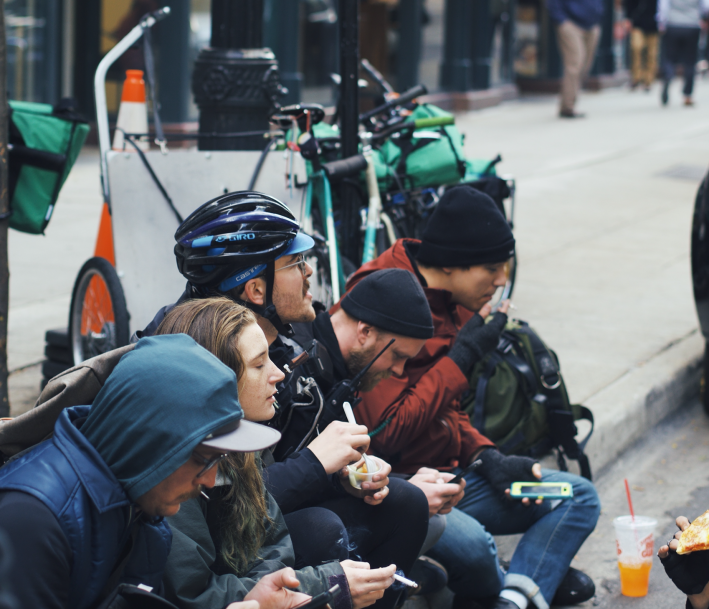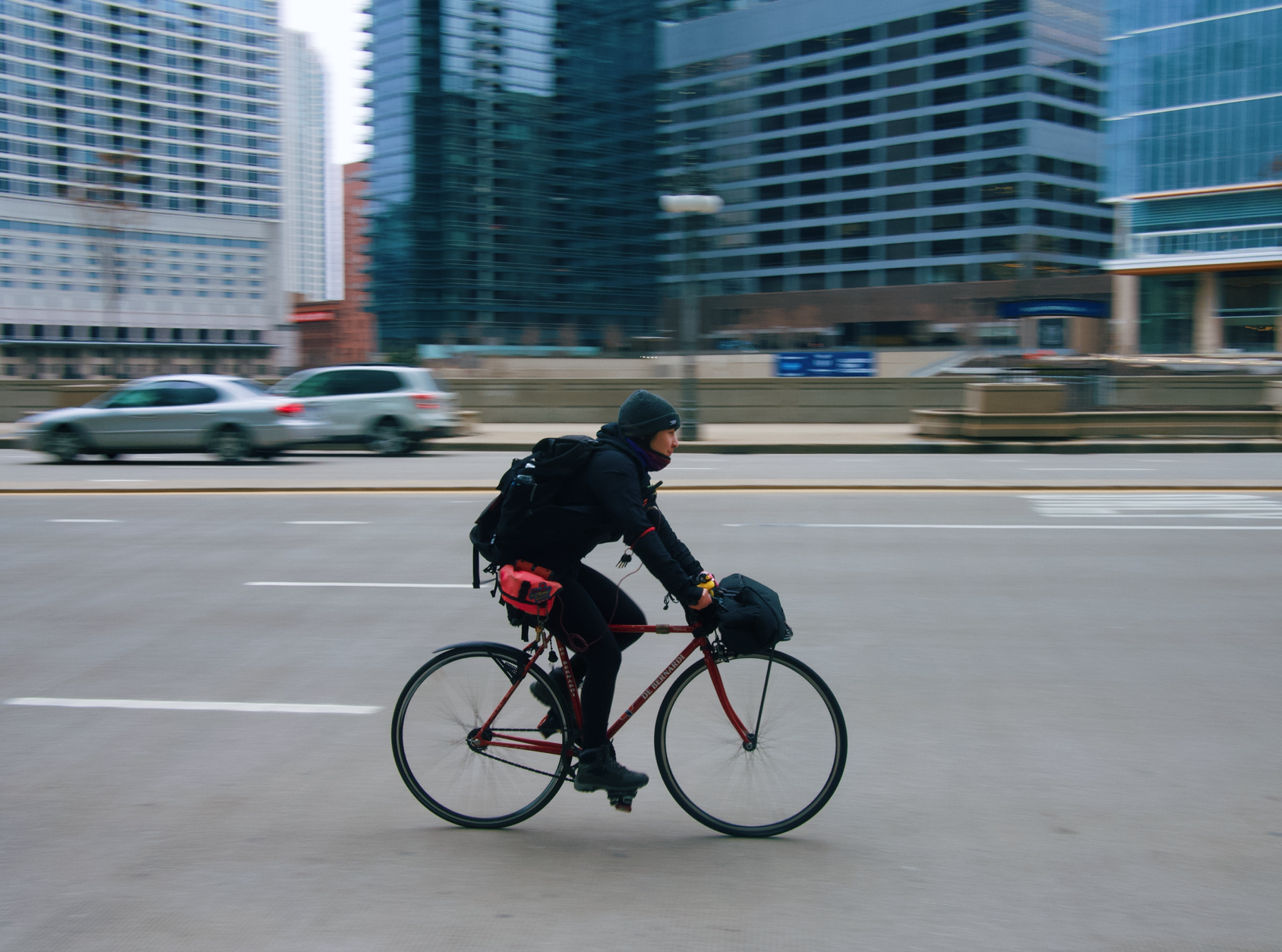As much of Chicago stays home to "flatten the curve" of coronavirus cases, and only essential businesses remain open, food delivery bikers pedal around the city to make sure people still get their food. And while downtown food couriers are losing money, other delivery cyclists say business is booming and they are grateful to have a job that can help others stay safe. But as the virus continues to spread in Chicago, some couriers are concerned about staying healthy, and worry how long they can keep working if more restaurants close.
Jennifer (she requested that we not publish her last name) loves getting paid to ride her bike all over downtown. She rides for Snap Courier, a downtown food delivery service that works with over 80 restaurants in the area.
But with many or most Loop office employees working from home during the pandemic, the demand for downtown deliveries has slowed to a trickle. Jennifer said she used to typically make $120 in three hours. Now, it’s down to about $50 in roughly five hours.
Jennifer said the ban on dine-in service during the crisis, which is fueling demand for delivery elsewhere in the city, isn't helping matters for downtown couriers. “A lot of restaurants are closing every day because it's not a good business [model] for them to keep the restaurant open just for a couple deliveries."
(After publication of this article, Jennifer told me that business has gotten a little better in the Loop, since some restaurants have reopened. She explained that while Cut Cats Courier -- more on that company below -- offered her a job delivering food in the neighborhoods, she is happy with Snap because it allows her to work her second job as a content creator for a local tattoo artist and gives her flexible hours. She added that Fridays are busier so she still enjoys working downtown.)
For Jared Mitchell, who rides with Cut Cats Couriers, every day is overshadowed by the possibility of contracting the disease. He said work days have been intense for the entire company, which is made up of more than 60 owner-operators.
“It's a blessing that we get to work during this, especially in a time where we're helping in such a crucial way," he said. "But don't get me wrong, it gets all of us. We're all afraid of what could happen." Mitchell said some riders have taken leaves of absence because the anxiety around the pandemic is too much to handle. But he said he's been relying on moral support from his colleagues. “Thank God for this collective because it's the best support center you could have."

Cut Cats is trying to have as many people riding as much as possible because there's plenty of delivery work in Lakeview, Logan Square and Wicker Park, especially for dinner. Laid-off restaurant employees have also recently joined the team. Mitchell said work has never been busier and he's glad to have the extra help.
Mitchell and Jennifer are trying to stay safe by wearing new gloves for each job, carrying hand sanitizer and doing no-contact deliveries, leaving food outside the customer's door. Both Cut Cats and Snap Courier are making sure to provide riders with ample gloves and sanitizer, the couriers say. Some restaurants are limiting the number of delivery workers who can wait inside for orders, but they have been generous about letting the couriers use the bathroom and wash their hands, Jennifer said.
Nicole Jameson, another rider with Snap Courier who also works for Caviar, has been wearing a balaclava over her mouth and nose to try to reduce her viral exposure. Las week, Governor J.B. Pritzker recommended that everyone wear a cloth face mask when going out, calling it a “commonsense” move. Although bike couriers have minimal contact with other people, Jameson and others are worried that it will be harder to maintain social distance when people flood the streets on nice weather days.
“So far as myself, I feel okay and safe," Jameson said. "But when I see so many other people out, it's like, well, they're not wearing masks and I don't know if they're washing their hands.”
Some third-party food delivery app companies faced scrutiny for their lack of safety measures for workers during the pandemic. But Jameson, who has used Caviar to supplement her income since February, said she was pleasantly surprised that the company is being proactive about safety. Caviar has locations in the city where delivery workers can pick up gloves and sanitizer. And on March 20 Caviar announced its new COVID-19 Financial Assistance Program, which gives any worker who gets the virus up to two weeks of financial help. Jameson said this effort makes her comfortable working for the service.
But above all else, couriers aren’t sure how they'll make ends meet if restaurants keep shutting down. Many are trying to work as much as they can now and save money in case business drops off in the future. “I know that business is kind of falling off for a lot of people and I'm concerned that we're only going to be able to keep it going for so long,” Jameson said. “It just feels like an... inevitability for us. We're the next thing on the proverbial chopping block.”
All the people I spoke with plan to keep delivering food for as long as possible. Jameson requested that people using their services be patient and mindful of the safety challenges facing couriers, and tip generously, since they are heavily reliant on gratuities.
“On the weekends, we're very, very inundated because [ordering food] is like the last thing that people can do to kind of feel like they're going out somewhere,” Jamison said. “I'm so psyched about it, but just know our restaurants are often working with a skeleton crew so [food] will take a while to get to us, and then it's going to take us a while to get to you. So just be kind.”
Here are some tips on preventing the spread of COVID-19, and advice for Chicagoans on what to do if you think you may have been exposed to the virus.





